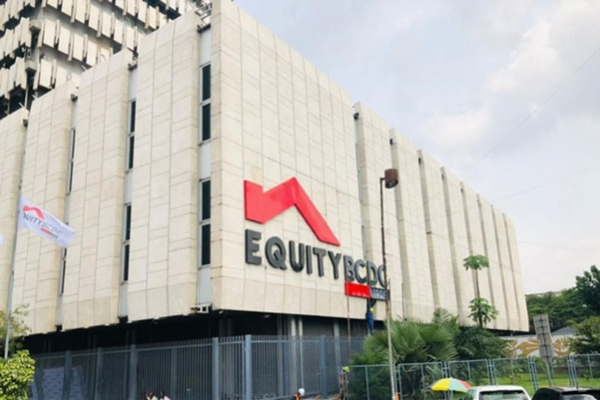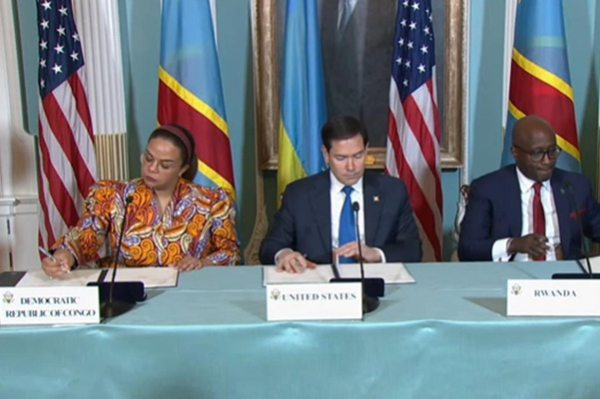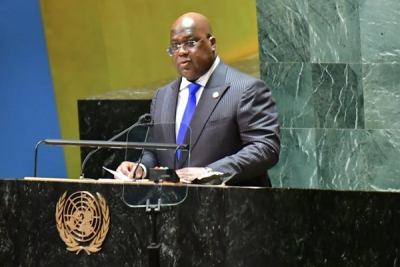
Economy (3)
The Equity BCDC inter-union has accused the bank of preparing a large-scale, disguised layoff, set to affect nearly 460 employees, which is about 27% of its total workforce at the end of 2023. This accusation appears in a letter dated June 17, 2025, addressed to the Minister of Labor, Ephraim Akwakwa Nametu.
The dispute began after an internal communication on June 6 stated that the parent company, Kenya-based Equity Group Holdings (EGH), suspects these employees of fraud following an internal investigation.
The bank’s management plans to launch a "rigorous and exemplary" disciplinary process, citing a zero-tolerance policy on fraud. However, the unions claim the bank ignored repeated requests for key information—such as the code of conduct, the full list of accused employees, the investigation period, and the alleged fraud amount—before taking action.
Despite receiving no clear answers, the bank reportedly sent explanation requests to the targeted employees starting June 10. In a June 12 letter to Equity BCDC, the inter-union condemned the bank’s "hasty" and "war-like" tactics. This is why the unions are appealing to the Minister of Labor to prevent what they consider to be a purge operation.
Rising Social Tensions
Since January 30, 2025, Equity BCDC and its staff have been in conciliation talks led by the General Labor Inspectorate. This mediation follows the bank’s failure to implement a protocol agreement signed on November 20, 2024, which included retroactive salary alignment from November 1 and the finalization of job classifications.
Unions argue the ongoing disciplinary drive is a maneuver to dodge these social commitments. Equity BCDC’s leadership has not publicly responded in the Democratic Republic of Congo. Earlier in June, Equity Group CEO James Mwangi announced a broad internal probe across subsidiaries after losses of roughly 2 billion Kenyan shillings (about $15.4 million) over two years. The losses allegedly stem from internal fraud involving offshore accounts and M-Pesa wallets.
In May 2025, the group notified 1,200 employees in Kenya of their dismissal as part of similar "purges", giving them 48 hours to prove their innocence. Those who failed faced immediate termination with minimal severance—salary up to the last day, one month’s notice pay, and unused leave compensation minus any debts.
This article was initially published in French by Timothée Manoke
Edited in English by Ange Jason Quenum
On April 25, 2025, the Democratic Republic of Congo (DRC) and Rwanda signed, in Washington, the "declaration of principles" to draw up a draft peace agreement for discussion on May 2.
The text lays down classic foundations: respect for sovereignty, non-interference, an end to support for armed groups, joint security coordination, return of refugees, support for MONUSCO, and promotion of regional economic integration. But an analysis of the speeches delivered at the signing reveals different priorities for different players.
DRC Puts Peace First
Congolese Foreign Minister Thérèse Kayikwamba Wagner, stressed the urgency of the move, saying: "In Goma, Bukavu and beyond, the reality is one of displacement, insecurity and hardship. For us, the urgency of this initiative is not theoretical, it is human."
She also demanded the "immediate, unconditional and verifiable" withdrawal of foreign troops, asserting that, "Peace must come first, then we can build trust, and only then engage in bilateral cooperation."
Rwanda Wants to Address Root Causes
Rwanda's Minister of Foreign Affairs, Olivier Nduhungirehe, for his part, insisted on the need to tackle the roots of the conflict: "We must address the root causes to achieve lasting peace," he insisted.
Kigali ties these causes to the "complex history" of the region. Rwanda continues to justify the M23's action by the defense of "Rwandophone populations" in Kivu and considers the Forces démocratiques de libération du Rwanda (FDLR), refugees in eastern DRC since the 1994 Rwandan genocide, as an "existential threat". The country's stated aim is to achieve "a secure region, free from violent ethnic extremism, and well governed."
US Targets Favorable Ecosystem
The United States, officially a "witness" to the process, is aiming beyond mediation. Secretary of State Marco Rubio said, "A lasting peace in the eastern Democratic Republic of Congo will open the door to greater US and Western citizen investment, which will create an ecosystem conducive to responsible and reliable supply chains for things like critical minerals. It's a win-win."
"We are discussing how to build new regional economic value chains linking our countries, including with US private sector investment," confirmed the Rwandan Minister of Foreign Affairs. Washington is currently negotiating a bilateral agreement with Kinshasa to secure access to strategic minerals.
Absent but Influential Players
Beyond the signatories, other players and interests are weighing in on the process. The United States accuses Chinese companies of taking advantage of the chaos to exploit resources illegally.
The governor of South Kivu, Jean-Jacques Purusi Sadiki, recently spoke of the existence of 1,600 illegal companies, mainly Chinese-owned, feeding a vast smuggling network that also benefits Rwanda. According to his estimates, 67% of this illegal production is destined for the Middle East, while China accounts for another significant share. Europe would remain marginal in these flows.
Countries such as Burundi and Uganda, as well as South Africa, which has already lost several soldiers, will also have to take their military interests into account. Finally, internal political tensions in the DRC further complicate the equation.
Authorities accuse former president Joseph Kabila of supporting the rebellion, adding a domestic political dimension to an already complex crisis.
This article was initially published in French by Georges Auréole Bamba
Edited in English by Ola Schad Akinocho
During his speech at the United Nations General Assembly on September 25, 2024, President Félix Tshisekedi stated that the Democratic Republic of Congo (DRC) needs $32 billion in annual investment to meet the Sustainable Development Goals (SDGs) by 2030. "The Democratic Republic of Congo, which has already affirmed its commitment to ambitious climate action, stresses the crucial importance of increased financial and technical support to strengthen its efforts to achieve the goals of the Paris Agreement," he said.
Tshisekedi outlined the DRC's economic vision, highlighting its role in combating climate change. "The Democratic Republic of Congo has abundant resources, including essential minerals such as cobalt, lithium, nickel, and graphite, which can facilitate a sustainable energy transition," he noted. This declaration emphasizes the DRC's goal to turn its natural resource exploitation into a means for sustainable and inclusive development.
The fight against climate change is central to Tshisekedi's vision for the DRC. As part of the Congo Basin forest, the country aims to be a key player in biodiversity preservation and promoting a green economy. He mentioned national initiatives to cut greenhouse gas emissions in agriculture and energy and emphasized the importance of the Trilateral Alliance for Cooperation on Tropical Forests.
However, Tshisekedi acknowledged that instability in eastern DRC hinders these ambitions. He pointed to the "aggression of the M23 group," which has led to significant population displacement. "The resurgence of the M23 terrorist group, supported by Rwanda, has caused an unprecedented humanitarian crisis, with nearly 7 million internally displaced people. This aggression constitutes a major violation of our national sovereignty."
Tshiseked asked the international community to condemn these actions and impose sanctions against Rwanda for its alleged involvement in the conflict. He also addressed the long-term effects of "genocide for economic gain" (Genocost) in the DRC and stressed the need for recognition and justice for victims. He affirmed that security is essential for sustainable economic development and reiterated the DRC's commitment to implementing the Disarmament, Demobilization, Community Rehabilitation and Stabilization Program (P-DDRCS).
Through this speech, Tshisekedi expressed the DRC's aspirations to play a significant role internationally, especially in energy transition and climate change efforts. Internally, this is reflected in government policies aligned with these objectives. In addition to participating in annual meetings, he and his teams continue to engage with various stakeholders.
Georges Auréole Bamba








